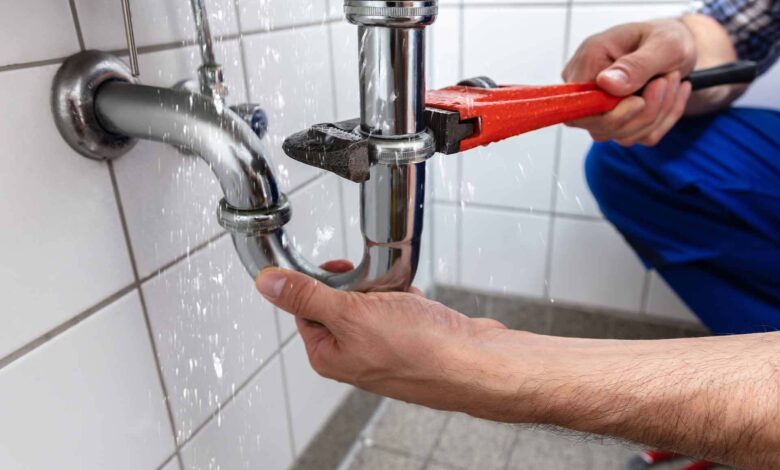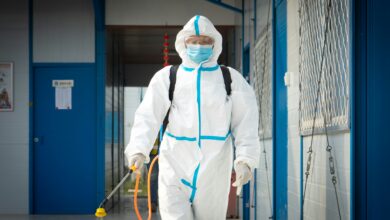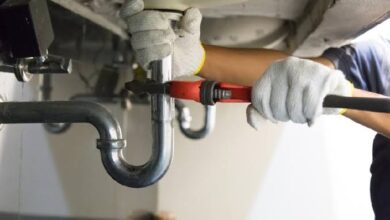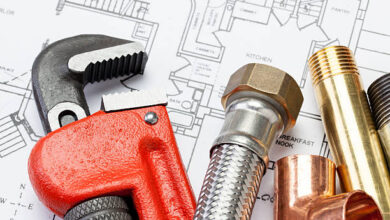Key Roles of Plumbers

Plumbers install and repair pipes that supply water and drain waste from homes and businesses. They also work on fixtures such as toilets and faucets.
Plumbers often work in cramped conditions and require physical strength to lift heavy tools. They must also be able to read blueprints and understand how to lay pipe systems during construction.
Installing
Installing a plumbing system is vital as plumbers help ensure water and other materials flow freely in residential and commercial settings. This involves setting up and repairing pipes that carry hot and cold water, gas, or sewage. Plumbers connect these systems to kitchen and bathroom sinks, toilets, appliances, and other fixtures.
This role requires attention to detail, good manual dexterity, and physical strength to work in tight spaces. You will also need to be creative when finding solutions to problems that arise during a job. Plumbers often use many tools to perform their jobs, including hand, power, and electrical equipment. These tools include pipe wrenches, flaring pliers, screwdrivers, hammers, soldering torches, and crimping equipment.
A plumber’s duties may include inspecting, assembling, and testing plumbing equipment. They may also be responsible for preparing cost estimates and negotiating prices for their services. They may need to review blueprints and building codes to determine the requirements for specific projects. They must also ensure that all plumbing works comply with relevant standards and regulations. Lastly, they may need to train apprentices and plumbing assistants. They also need to communicate effectively and resolve conflicts with clients.
Repairing
Plumbers inspect, test, and repair water supply, drainage, heating, and sewage systems to ensure they function correctly. They also use various hand tools, power tools, and equipment to complete their work. They may also need to lift heavy materials and work in cramped spaces. Plumbers can expect to be exposed to various health and safety risks, including raw sewage, electricity, extreme temperatures, and chemicals.
Some plumbers specialize in tasks like pipe system installations or residential plumbing jobs. Others focus on repairing and maintaining existing plumbing fixtures, toilets, and appliances. Plumbers in Dallas specializing in installation can often work on new construction projects like apartments, offices, and hospitals. These plumbers must have extensive knowledge of building codes and regulations to correctly install the water and drainage systems.
Plumbers can also be found working in industrial settings where they are responsible for assembling, detecting issues, and repairing large-scale plumbing systems that serve entire buildings or complexes. These plumbers will need extensive experience with all aspects of plumbing and be able to handle a wide range of different pipes and appliances. They will also need to be able to troubleshoot problems and find solutions quickly. This type of plumbing job is more dangerous and requires plumbers to be prepared for a wide range of potential hazards.
Maintaining
As part of their role, plumbers regularly maintain and inspect plumbing systems to ensure they work correctly. This includes clearing obstructions from drains, testing equipment to find leaks and faults, and ensuring that water supply and drainage pipes are adequately sized for the water and gas they carry. They also liaise with project managers to ensure that plumbing operations align with the construction schedule and objectives. In addition, they train and supervise apprentices and plumbing assistants.
Plumbers often work on residential and commercial buildings, so they must be comfortable working in confined spaces. They use tools such as saws, drills, pipe cutters, and measuring devices to install and repair plumbing fixtures and pipes. They may also use power tools to operate valves and other mechanical components.
Plumbers need excellent analytical skills to determine the cause of problems and make informed decisions. They also need good communication skills to interact with customers and explain the costs and processes of repairing their plumbing systems. Finally, plumbers need physical strength to lift heavy materials and work awkwardly. They should also be familiar with plumbing codes and regulations in their jurisdiction. They may also need to obtain a license to work as a plumber. This requires passing an exam and meeting licensing requirements.
Troubleshooting
Plumbers need strong communication skills to understand what the customer is saying. This allows them to determine the issue and make the proper repairs. It also helps avoid misunderstandings and conflicts. Additionally, plumbing involves physical strength and skill to lift heavy materials, work in tight spaces, and climb ladders. Plumbers are usually on call at night and during weekends to respond to emergencies.
Leaky pipes are the most common cause of plumbing problems. They can waste water, rot wood, and cause rust in metal parts. They can even create breeding grounds for pests and bacteria. Plumbers often use power tools to clear clogged drains and sewer lines. They also install water heaters, faucets, and shower heads.
Plumbing is a skilled trade that requires extensive on-the-job training and apprenticeships. Many plumbers have completed an apprenticeship program that lasts four to five years, including classroom instruction and paid on-the-job training. Others have a high school diploma or equivalent and have taken post-secondary classes in plumbing technology.
A career as a plumber can be gratifying. It offers a high salary and benefits, as well as job security. Plumbers are needed in both residential and commercial settings. They are often required to do inspections and maintenance tasks in high-rise apartments, schools, and offices. They are also needed in mining and construction sites to help with pipe installation and repair.



